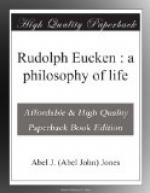But religion is not gained, any more than human freedom, once for all time—it must be gained continually afresh, and sought ever anew. Thus the fact of religion becomes a perpetual task, and leads to the highest activity.
Eucken speaks of two types of religion—Universal and Characteristic Religion. The line of division between them is not easy to draw, but the distinction gives an opportunity for emphasising again the essential elements of true religion.
Universal Religion is a more or less vague appreciation of the Spiritual, which results in a diffused, indefinite spiritual life. The personality has appreciated to some extent the opposition between the natural and the spiritual, and has chosen the spiritual. He adopts a new attitude or mood, towards the world in consequence, and that is an attitude of fight against the world of nature. But everything is vague; the individual has not yet appreciated the spiritual world as his own, and feels that he is a stranger in the higher world, rather than an ordinary fully privileged citizen. He has not yet associated himself closely enough with the Universal Spirit, everything is superficial, there is hunger and thirst for the higher things in life, but these have not yet been satiated.
Some people never get beyond this vague appreciation of the spiritual until perhaps some great trial or temptation, a long illness or sad bereavement falls to their lot. Then they feel the need for a religion that is more satisfying than the Universal Religion with which they have in the past been content. They want to get nearer to God; they feel the need of a personal God who is interested in their trials and troubles. They are no longer satisfied with the conception of a God that is far away, they thirst for His presence. This feeling leads the individual to search for a more definite form of religion, in which the God is regarded as supremely real, and reigns on the throne of love. The personality enters into the greater depths of religion, and it becomes a much more real and powerful influence in his life. He has no longer a mere indefinite conception of a Deity, but he thinks of God as real and personal. Instead of adopting a changed attitude towards the world of nature, he comes to demand a new world. He is now a denizen of the spiritual world, and there results “a life of pure inwardness,” which draws its power and inspiration from the infinite resources of the Universal Spiritual Life in which he finds his being. This type of religion Eucken calls Characteristic Religion.
The historical religions would seem to represent, to some extent, the attempts of humankind to arrive at a religion of this kind. A further distinction arises between the historical forms of religion, of which one at most, if any, can express the final truth, and the Absolute form of religion, which if not yet conceived, must ultimately express the truth in the matter of religion.




